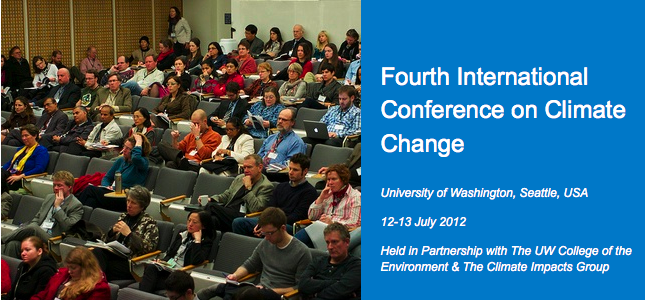I have just returned from a climate change conference in Seattle, Washington where I have presented some of our group’s work. I would like to share with you a list of the main themes of the conference to illustrate the broad scope and cross-disciplinary nature of this topic. I will have more to add on the matter next week.
What is evidence is there of climate change?
- Paleoclimatology: the earth’s climate in a long view
- Climate change today: examining the data
- Ice cap reduction and glacial melt
- Sea level change
- Floods, drought, forest fires, hurricanes and other sporadic events
- Albedo or measuring the earth’s reflectiveness
- Meteorology and climate informatics
- Equilibria and disequilbria: change processes and countervailing tendencies
- Climate measurement processes, methodologies and technologies
- Reading complex, dynamic and unstable systems
- Developing local and global climate models
- Change scenarios: slow, rapid, abrupt or episodic
Theme 2: Assessing Impacts in Divergent Ecosystems
What are the impacts of climate change on natural environments?
- Ocean currents and el Niño
- Riverine ecosystem impacts
- Mountain ecosystem impacts
- Coastal ecosystem impacts
- Marine ecosystem impacts
- Forest and grassland ecosystem impacts
- Impacts on wilderness and protected areas
- Impacts on specific biomes
- Impacts on biodiversity, potential extinctions
- Hardiness zone migration
- Regional variations: temperature and rainfall
Theme 3: Human Impacts and Impacts on Humans
What evidence is there that human activity has contributed to climate change, and what are the impacts of climate change on human life?
- Anthropogenic factors in climate change: determining the relative contribution of natural and human causes
- Impacts of carbon dioxide and other greenhouse gases
- Land use patterns, agriculture and livestock husbandry and deforestation as factors in climate change
- Impacts on humans: agriculture, fish stocks, food supply, health
- Human settlements and sea level rise
- Impacts on humans: water supply, desertification
- Impacts on humans of intense weather events, natural disasters and ecological surprises
- Impacts of climate change in the developing world
Theme 4: Technical, Political and Social Responses
How do scientists, technologies, policy makers and community members respond to climate change?
- Environmental policies in response to climate change
- Controversy and denial: politics, the media and scientists with dissenting views
- The international politics of climate change
- The past, present and future of international agreements
- Education and awareness for management of global climate change
- Protected areas and preservation of biodiversity: ‘corridoring’ and other strategies
- Strategies for sustainability
- Human adaptive strategies
- Technologies of mitigation: carbon dioxide sequestration, solar shades and other processes
- Alternative and renewable energy sources: technologies, policies and strategies
- Carbon taxes, offsets and trading
- Emission standards
- Climate ethics and the precautionary principle
- Eco-development, eco-efficiency


Muchos Gracias for your article post. Fantastic.
You really make it seem so easy with your presentation but I find this matter to be
really something which I think I would never understand.
It seems too complicated and extremely broad for me. I am looking forward for
your next post, I’ll try to get the hang of it!
Pingback: July in Southern Africa – Mauritius | ClimateChangeFork
Verdaderamente esto me ha resultado útil. Si bien debo reconocer que algún otro post
de otro día no me convenció tanto, el de hoy me ha gustado bastante.
Saludos y gracias
Pingback: Climate Change as a Bridge Maker | ClimateChangeFork